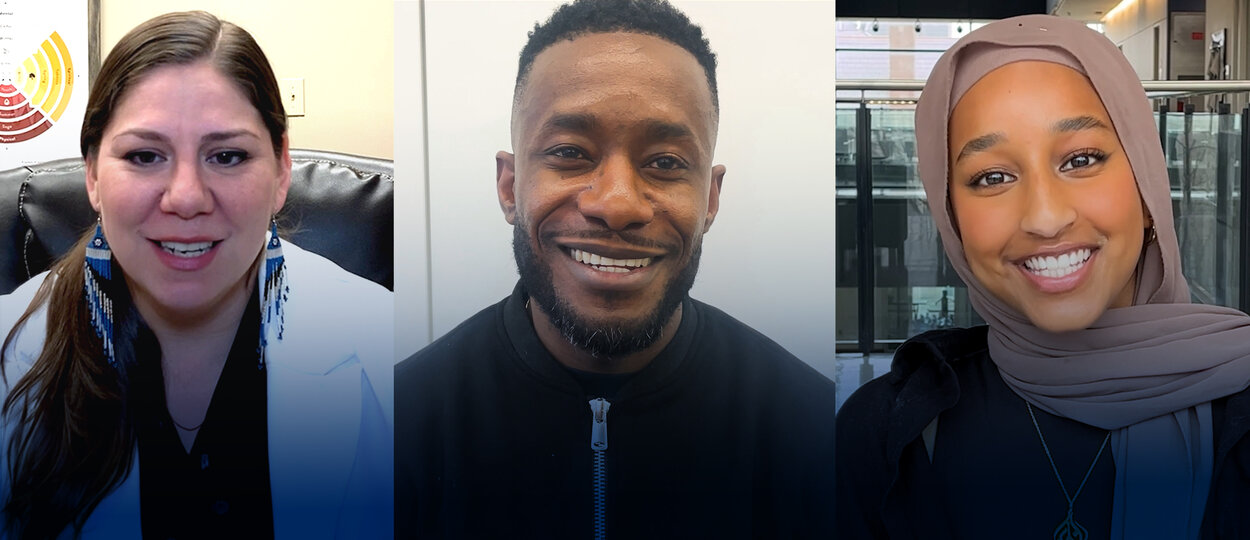Lachmi Singh and Sandra Bjelajac Mejia are exploring ways to increase diversity of pharmacy profession by engaging students and educators
For years, pharmacists and pharmacy leaders in Canada have recognized that pharmacy – like many health care professions – does not consistently represent the diversity of the patients it serves. A 2023 national survey of graduating pharmacy students led by the Association of Faculties of Pharmacy (AFPC) suggests that the student population does not represent the diversity of the patient population it will serve when compared to provincial demographic data, particularly among underserved populations including Black and Indigenous Peoples. And this disproportionate underrepresentation in the pharmacy profession can have a real impact on the care that patients receive.
“There are strong historical reasons why some communities mistrust the health system, and we recognize that if the profession better represents the population overall, it will serve the community better,” says Sandra Bjelajac Mejia, assistant professor (teaching stream) at the Leslie Dan Faculty of Pharmacy. “Pharmacists need to have the cultural competency to serve their diverse patient communities and provide the best possible patient care.”
Mejia and Lachmi Singh, director of education programs and administrative services and director of equity, diversity and inclusion (EDI), have worked together for several years to develop EDI initiatives at the Faculty to support current and future students from diverse backgrounds and, in the long term, increase diversity in the pharmacy profession.
In 2022, Singh and Mejia received nearly $100,000 funding from the U of T Access Programs University Fund (APUF). The project, known as PharmPath, aims to help high school students better understand career opportunities in the pharmacy profession and perhaps ultimately choose to pursue a career in pharmacy. Singh and Mejia hope that diverse students, especially Black and Indigenous students, will see that pharmacy is an exciting and dynamic career path.
With high school students in mind, the project developed web-based simulations highlighting various scenarios in pharmacy practice. The simulations, co-created with pharmacists and pharmacy technicians from various practice settings, feature diverse pharmacy professionals helping youth with common issues such as vaccinations, sexual health, and sports injuries. The project also developed videos of students and pharmacy professionals from diverse backgrounds speaking about their path to pharmacy, challenges they have faced, and how they have managed them. “There’s something about being able to see representation and hearing someone’s story and making that connection with your own experience,” says Singh. “Being able to see that someone with similar experiences to you has gone through this path and is now sharing their experiences helps to show that this path is also open to you.”
Singh and Mejia also collaborated with faculty and students in the Design for Social Change course at Seneca College to develop a social media campaign to incorporate in the promotion of the simulations.
Working with STEM Fellowship, the completed simulations and videos will be hosted on a virtual classroom for high school students to access anywhere. In March 2024, the Faculty will host students, for a one-day experiential opportunity, who have completed the simulations and want to learn more about the profession. The day will consist of opportunities to experience pharmacy practice, meeting with current students and practicing pharmacists, explore opportunities for research, and experience the Faculty and University learning environment.
“We all got started in pharmacy because someone introduced us to the idea or showed us something that sparked an interest in the profession,” says Mejia. “We’re hoping that when the students come for a day and actually see people in action, they will be inspired by what they see and the impact they can have.”
New funding to bring educators together to understand education barriers
While Singh and Mejia have been developing EDI initiatives focused on students for the last few years, their newest project, funded through a McKesson Foundation grant worth more than $580,000, is focused more on educators.
The project will bring together educators from primary and secondary schools, as well as colleges and different faculties in the health sciences, to understand the barriers that students from underrepresented communities face in education. This understanding will help educators work toward creating learning environments that better include diverse communities and equip graduates to provide the best possible care for the communities they serve.
“By the time Black and Indigenous students get to post-secondary school, many have already experienced barriers far earlier in their education. The students who come to post-secondary have managed to navigate or overcome those barriers, but a large group is not represented,” says Singh. “As educators, we need to think about how we can work with those students and our education partners in identifying these barriers and supporting students and their families.”
For example, some students may need more information about prerequisites for certain post-secondary programs and guidance with choosing courses for health sciences programs.
One of the aims of the project is to host roundtable meetings with health sciences faculties and educators to explore teaching methods that resonate with diverse communities and report back to faculties about their findings through a written report and series of workshops. By including other health profession faculties – many of which face similar underrepresentation of Black and Indigenous students – Singh and Mejia say that educators can make connections and work collaboratively.
“There is knowledge out there that we need to tap into, and learning from other disciplines is paramount,” says Mejia. “This isn’t an issue that affects pharmacy in isolation. We all need to think about how we encourage students to pursue careers in health care and how we can support them to do that.”
More News
Image

How Bebe Simelane’s summer research is fueling her passion for science
Through hands-on research, mentorship, and exposure to cutting-edge tools like AI, this USRP student is gaining the skills and confidence to pursue graduate studies and advance science.
Read More
Image

Faces of PharmSci: Kristy Scarfone
Co-supervised by Professor Jillian Kohler and Assistant Professor Jaris Swidrovich, MSc student Kristy Scarfone is researching how unregulated substance-related care and harm reduction vary across Ontario, with the goal of strengthening public health and showcasing pharmacists’ impact in this area.
Read More
Image

Research team aims to co-design diabetes and dementia support programs that meet community needs
Network for Health Populations funding will support collaborative project to improve health outcomes for immigrant communities in Mississauga.
Read More

